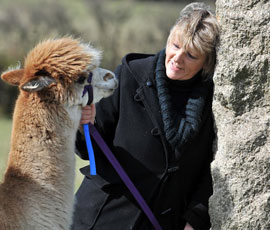Livestock owner confirmed with bovine TB

A livestock owner who started a website to raise awareness of bovine tuberculosis has herself contracted the disease.
Dianne Summers started AlpacaTB.com to highlight the risk posed by bovine TB to camelids, such as alpacas and llamas, and provide advice to their owners.
More usually associated with badgers and cattle, bovine TB has also affected 56 alpaca and llama herds in England and Wales as of 1 March 2012.
Ms Summers, who lives near Redruth, Cornwall, founded the Camelid TB Support & Research Group after losing one of her own alpacas to the disease almost four years ago.
“The initial phone call when you are told that the post mortem has revealed suspicion of TB in your herd is devastating,” she wrote afterwards.
The group and its website have since become an important source of information about bovine TB for camelid owners across the country.
But now Ms Summers has herself contracted the disease.
An update posted on the group’s website said: “Dianne Summers has had confirmation that she has TB mycobacterium bovis herself and has begun treatment.
“Human treatment for TB mycobacterium bovis takes nine months and consist of a variety of drugs with some unpleasant side effects – it is not a quick or simple fix.
“We wish her a full and speedy recovery.”
This underlines the reasons TB should be taken so seriously, says the website.
“If it is in your herd you, your family and friends can contract TB. TB is a zoonotic disease – to be clear that means it can be passed on to people.”
Human cases of mycobacterium bovis were once relatively common.
More than 50,000 new cases and 2,500 human TB deaths were reported annually in Britain during the late 19th and early 20th centuries.
But the toll reduced with pasteurisation laws and eradication programmes in cattle.
Today, bovine TB is believed to behind only 1% of TB cases in the western world. The rest are caused by the human TB bug mycobacterium tuberculosis.
For more on this topic
See our special badger cull pages
